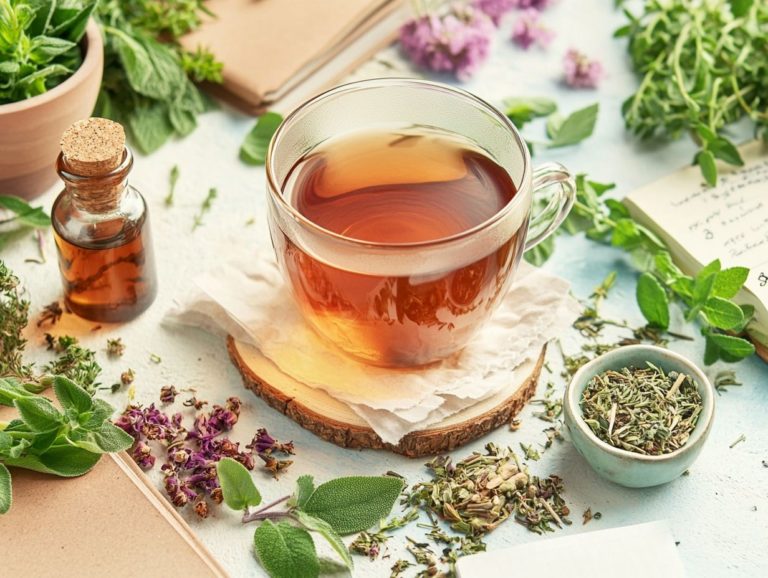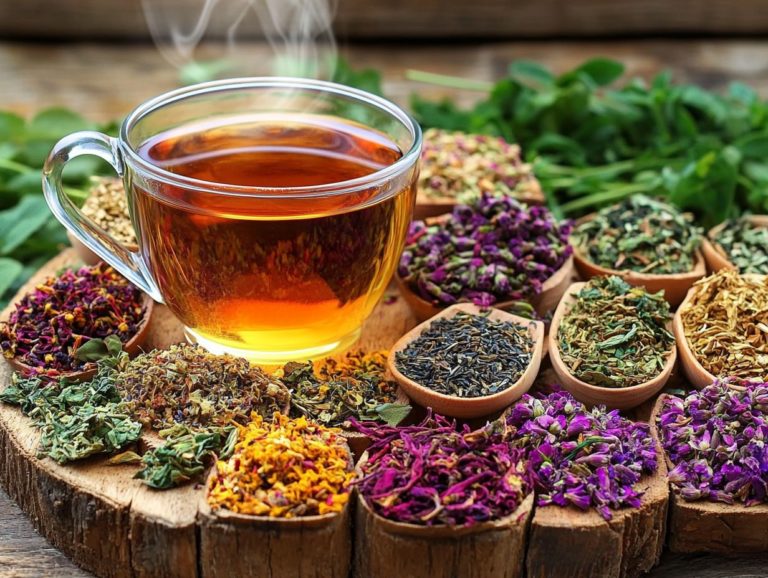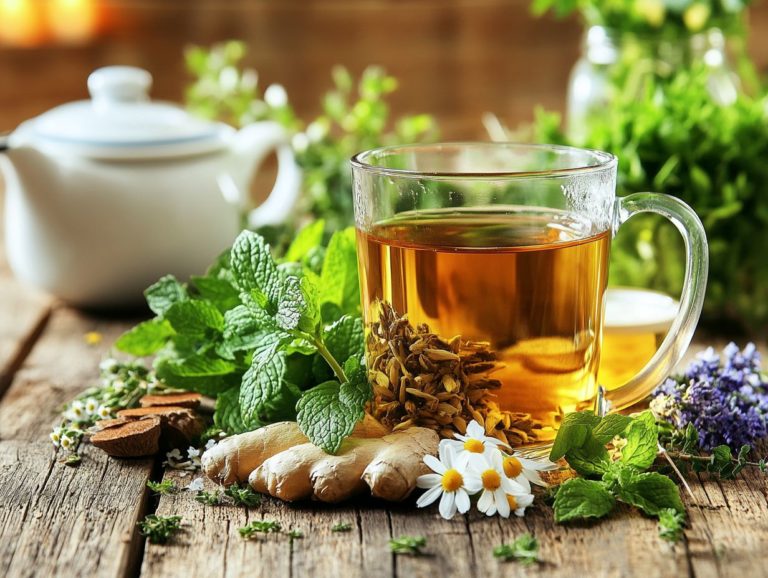What Should I Know About Herbal Remedies and Pregnancy?
Pregnancy is an exhilarating journey filled with change, yet it often presents challenges that many expectant mothers seek to address through natural solutions. When considering relief from discomforts and a boost in wellness during this remarkable time, plant-based treatments frequently come to mind. However, it’s essential to recognize that not all plants used to improve health are safe for use during pregnancy, and understanding their benefits and risks is paramount.
Let s explore exciting herbal remedies that can help you thrive during pregnancy! This article emphasizes safe options, potential hazards, and the vital role of consulting healthcare providers for a healthy and well-informed experience.
Contents
- Essential Insights for Expectant Mothers!
- Benefits of Herbal Remedies During Pregnancy
- Herbs to Avoid During Pregnancy
- How to Use Herbal Remedies During Pregnancy
- Consulting with a Healthcare Provider and Understanding herbal medications
- Frequently Asked Questions
- What Should I Know About Herbal Remedies and Pregnancy?
- Are Herbal Remedies Safe to Use During Pregnancy?
- What Are Some Common Herbal Remedies Used During Pregnancy?
- What Are the Risks of Using Herbal Remedies During Pregnancy?
- Can Herbal Remedies Help with Common Pregnancy Symptoms?
- What Should I Do if I Experience Any Negative Reactions to Herbal Remedies During Pregnancy?
Essential Insights for Expectant Mothers!

- Plant-based treatments can offer natural benefits during pregnancy, but it’s important to understand their potential risks and consult with a healthcare provider before use.
- Some plants may be harmful during pregnancy and should be avoided. Always research and carefully read labels before using any herbal remedies during pregnancy.
- When used safely and with professional guidance, herbal treatments can aid in common pregnancy discomforts and promote overall well-being for both you and your baby.
What are Herbal Remedies?
Herbal remedies, drawn from a diverse array of plants used to improve health, have been celebrated for centuries across various cultures as a natural alternative to modern pharmaceuticals. These remedies encompass a wealth of products, from soothing herbal teas to aromatic essential oils, all designed to promote health and well-being through nature’s bounty.
When exploring plant-based treatments, crafted from either fresh or dried herbs, you might find recommendations for alleviating various ailments and enhancing your overall health. However, it s vital to consult a qualified medical herbalist for expert guidance tailored to your needs.
Historically, cultures worldwide have relied on the healing properties of plants, amassing a rich repository of knowledge that still significantly informs contemporary herbal practices. Today, you’ll encounter a myriad of options everything from calming chamomile teas to immunity-boosting echinacea supplements each promising various therapeutic benefits.
Amidst these enticing options, it s essential to recognize that not all herbal treatments will suit your individual needs. Therefore, seeking professional advice is key to ensuring both safety and effectiveness when selecting the right herbal products to support your health journey.
Safety Considerations During Pregnancy
Understanding safety considerations during pregnancy is essential. Many women turn to plant-based treatments to ease pregnancy symptoms like nausea or fatigue, but it’s important to remember that not all herbal products are safe.
While some herbal options may appear natural, they can come with unexpected side effects or interact negatively with prenatal vitamins and vital medications. To stay informed, it’s important to understand are there side effects of herbal remedies. You should always consult your healthcare provider about any herbal treatments you’re contemplating.
By doing this, you can more effectively navigate the potential risks associated with certain herbs, such as uterine contractions or hormonal imbalances, which could pose threats to both you and your baby. For more information, check out what you should know about herbal remedies for colds. Sticking to recommended doses and focusing on well-researched, safe herbal remedies can significantly mitigate risks while providing the relief you need during this critical period.
Benefits of Herbal Remedies During Pregnancy
Plant-based treatments present a wealth of benefits during pregnancy, serving as natural solutions for many common symptoms while promoting overall well-being. Many women seek out herbal therapy for relief from nausea, improved sleep, and increased energy levels.
However, it s crucial for you to select the right herbal products and grasp their effectiveness. When chosen wisely and under the guidance of a qualified herbalist, these carefully selected treatments can beautifully complement your prenatal care and support a healthy pregnancy.
Take charge of your health during this beautiful journey!
Common Uses and Potential Benefits

Common uses of herbal remedies during pregnancy include delightful herbal teas made from ginger, chamomile, and red raspberry leaf. Each of these is celebrated for its soothing properties.
These herbal ingredients may help you alleviate nausea, promote relaxation, and support uterine health. They are popular choices among expectant mothers.
Take ginger, for instance a well-known remedy for nausea. You can enjoy it in various forms, but a delightful tea made by steeping fresh or dried root in hot water for about 10 minutes works wonders. A healthful dose typically ranges from one to three cups daily, effectively easing morning sickness.
Chamomile tea, renowned for its calming effects, is another appealing option. Simply infuse dried flowers in boiling water for about five minutes; one or two cups a day may be just what you need for relaxation.
Red raspberry leaf tea is often recommended for supporting uterine health. It s made by steeping dried leaves in a similar fashion, with a daily intake of one to four cups, providing you with essential nutrients.
Incorporating these herbal teas into your balanced diet not only promotes overall wellness during pregnancy but also enhances your experience of motherhood.
Herbs to Avoid During Pregnancy
Certain herbs can present risks during pregnancy, and it s crucial to avoid them to safeguard both your health and that of your child. Herbs such as black cohosh and blue cohosh have been associated with complications and an elevated risk of miscarriage, especially in the early stages.
As an expecting mother, it’s important to remain informed about these herbs and consult with your healthcare provider for guidance on safe alternatives. For more detailed information, you can refer to herbal safety: what you need to know. Your well-being and your baby’s health should always come first.
Potentially Harmful Herbs
Certain herbs are considered potentially harmful during pregnancy due to their associated risks and possible adverse interactions with other medications. Regarding herbal medicine, the risks linked to potent ingredients must be thought through carefully to protect both you and your baby.
It s important for you to conduct thorough research and consult with a qualified herbalist or healthcare provider before introducing any herbal products into your routine.
Among these herbs, black cohosh and pennyroyal stand out for their potential to induce labor or cause uterine contractions, which could jeopardize your pregnancy. Some herbs like sage and thyme contain compounds that might disrupt hormonal balance or impact fetal development. Furthermore, some herbal supplements can negatively interact with prescribed medications, underscoring the importance of professional guidance.
By staying informed and making educated choices about herbal treatments, you not only safeguard your well-being but also create a safer environment for your baby’s growth and development. If you’re curious about are herbal remedies safe for children, it’s crucial to explore this topic further.
How to Use Herbal Remedies During Pregnancy
Using herbal remedies safely during pregnancy demands your careful attention to dosage, preparation methods, and an understanding of the safety of herbal products. As an expecting mother, it s crucial for you to adhere to recommended doses and guidelines, ensuring that your herbal practices protect both your health and that of your child.
Consulting with a healthcare provider or a qualified medical herbalist, a professional who specializes in the safe use of herbs for healing, can greatly assist you in incorporating herbal treatments into your prenatal care regimen with confidence and safety.
Guidelines for Safe and Effective Use

For the safe and effective use of herbal remedies during pregnancy, it’s essential to follow established guidelines. This helps avoid any adverse effects and ensures beneficial outcomes. Always consider the quality and source of herbal preparations. Remain vigilant for potential adverse interactions. Seek advice from doctors or health experts whenever needed.
Incorporating safe herbal remedies into your routine can enhance your health. This ensures you don’t compromise on safety.
As someone who is expecting, prioritize sourcing high-quality, organic herbs. This helps minimize exposure to pesticides or contaminants that might pose risks. Be watchful for potential interactions between herbs and prescribed medications; many substances can alter drug effectiveness or lead to unforeseen complications. For more information, consider what you should know before using herbal remedies.
Consulting a knowledgeable healthcare provider is crucial. They can provide tailored guidance based on your individual health needs. By adhering to these safety protocols, you protect maternal and fetal health. This also helps you cultivate a more informed and confident approach to herbal usage during this critical period.
Consulting with a Healthcare Provider and Understanding herbal medications
Curious about the importance of consulting a healthcare provider? It’s essential for pregnant women contemplating the use of herbal remedies. Professional guidance enables you to make informed and safe choices tailored to your unique health needs.
A qualified medical herbalist can offer valuable insights into effective herbal products, dosage recommendations, and potential risks. This fosters a supportive atmosphere for your health and wellness throughout your pregnancy.
This collaboration deepens your understanding of safe herbal practices and enriches your overall prenatal experience.
Importance of Professional Guidance
The significance of professional guidance when using herbal remedies during pregnancy cannot be overstated. It ensures that you, as a mother-to-be, make well-informed choices regarding your health and that of your baby. Healthcare providers possess critical knowledge about potential herbal interactions, safety concerns, and appropriate dosages. All these factors can greatly influence the effectiveness of herbal treatments.
As an expecting mother, prioritize consultations with qualified professionals to navigate herbal dosage guidelines for pregnant women safely.
These interactions can affect drug metabolism, which refers to how your body processes medications, or could lead to unexpected reactions that may pose risks to both you and your child. By working closely with healthcare practitioners, you gain valuable insights into what you should know about herbal remedies and ethnicity, which may be beneficial or harmful during pregnancy. This enhances your overall well-being.
Healthcare providers can monitor your progress and adjust recommendations as necessary. This creates a personalized approach tailored to your unique circumstances. This collaborative effort fosters security and enables you to embrace natural remedies with confidence and responsibility.
Frequently Asked Questions
What Should I Know About Herbal Remedies and Pregnancy?

It s crucial to understand herbal risks and the moderation required when using these remedies. Herbal remedies have become increasingly popular among pregnant women seeking alternative and natural ways to manage common pregnancy symptoms. However, it is important to have a thorough understanding of the potential risks and benefits before incorporating them into your pregnancy routine.
Are Herbal Remedies Safe to Use During Pregnancy?
While many herbs are generally considered safe for use during pregnancy, it’s always best to consult your healthcare provider before taking any herbal supplements. This is especially important if you have any preexisting medical conditions or are taking other medications.
What Are Some Common Herbal Remedies Used During Pregnancy?
Raspberry leaf, ginger, and chamomile are popular herbal remedies during pregnancy. Raspberry leaf may help tone the uterus for labor.
Ginger can ease nausea, while chamomile promotes relaxation and better sleep!
What Are the Risks of Using Herbal Remedies During Pregnancy?
Some herbal remedies can interact with medications or cause side effects, especially in high doses. The safety of many remedies during pregnancy hasn’t been thoroughly studied, so unknown risks may exist.
Can Herbal Remedies Help with Common Pregnancy Symptoms?
Yes! Certain herbal remedies can relieve common pregnancy symptoms like nausea, insomnia, and muscle aches.
Always discuss with your healthcare provider to ensure they’re safe for you and your baby.
What Should I Do if I Experience Any Negative Reactions to Herbal Remedies During Pregnancy?
If you have any negative reactions after taking an herbal remedy, stop immediately and talk to your healthcare provider.
They can guide you on what to do next and ensure both you and your baby are safe!






